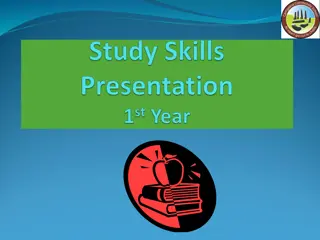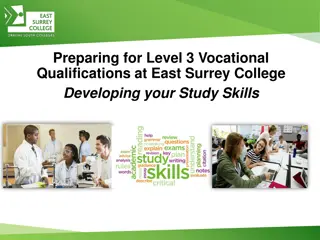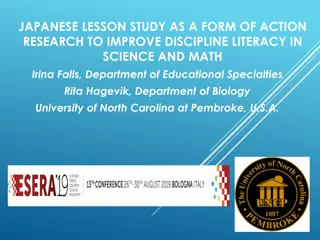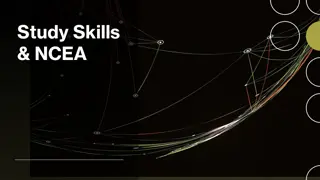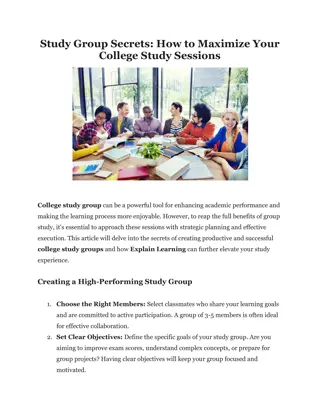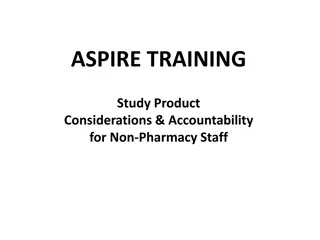How to read effectively for study
Enhance your study skills by mastering the art of effective reading. Discover techniques to improve comprehension, retention, and recall. Learn how to skim, scan, and delve deep into texts, making the most of your study time. Develop a systematic approach to reading that boosts your understanding and knowledge retention. Whether you're a student or a lifelong learner, these strategies will help you study smarter, not harder.
Download Presentation

Please find below an Image/Link to download the presentation.
The content on the website is provided AS IS for your information and personal use only. It may not be sold, licensed, or shared on other websites without obtaining consent from the author.If you encounter any issues during the download, it is possible that the publisher has removed the file from their server.
You are allowed to download the files provided on this website for personal or commercial use, subject to the condition that they are used lawfully. All files are the property of their respective owners.
The content on the website is provided AS IS for your information and personal use only. It may not be sold, licensed, or shared on other websites without obtaining consent from the author.
E N D
Presentation Transcript
STUDYUP: KNOWLEDGE TO GO How to read effectively for study How to read effectively for study
STUDYUP: KNOWLEDGE TO GO Learning outcomes By the end of this workshop, you should have a better idea how to: Read with a purpose Adjust your reading technique for purpose Take notes
STUDYUP: KNOWLEDGE TO GO Reading myths You need to read most of what s on your reading list, starting at the top and working your way down. All books and articles are well written and truthful. You can t really disagree with an academic text, because you re not an expert. Intelligent people only need to read things once
STUDYUP: KNOWLEDGE TO GO Stay awake Active reading I pick up my textbook, but find myself daydreaming about what to have for dinner, or the TV show I watched last night Reading for study requires not just your eyes, it requires active effort that engages your brain. Try active reading: techniques to help you concentrate and stay focused.
STUDYUP: KNOWLEDGE TO GO Active reading techniques Have a clear purpose Why are you reading the book/article? Adjust reading technique for purpose Scanning, skimming, close reading Link back to what you already know How does it relate to what you ve experienced/read? Take notes Finding a method that suits you and the purpose
STUDYUP: KNOWLEDGE TO GO Read with a purpose How do you know what to read? Weekly study: Understand course lecturer s expectations See Stream (text book chapters for that week, selected readings) For assignments: Understand assignment question Start with relevant sections of textbook List of readings Consult lecture and tutorial notes
STUDYUP: KNOWLEDGE TO GO Taking control of your reading Understanding assignment questions What is the topic? What is the focus? What are you being asked to write about? Use the essay question to guide your selection of readings. Sample essay question: To what extent is there a correlation between the levels of happiness experienced by cats, and the dog being made to sleep outside? Broad topic: levels of happiness experienced by Focus: the dog being made to sleep outside
STUDYUP: KNOWLEDGE TO GO Possible articles from your reading list Which ones are relevant? Parts will be relevant Gibney, J., & Vorster, H. (2018). The psychology of cats and dogs: An introduction. Blackwell. Looks directly relevant Hira, T. (2023). Levels of happiness in cats. The International Journal of Pet Psychology, 1, 22-45. Doesn t look relevant McArdle, J., & Katch, M. (2012). The history of domestic pets in Samoa. Penguin.
STUDYUP: KNOWLEDGE TO GO Searching for additional sources Which ones would you use? Graham, C. (2015, January 12). Why cats and dogs fight. Australian Women s Weekly, 21(1), 21-24. Dog-cat relationship. (2019). http://en.wikipedia.org/ wiki/Relationships_between_cats_and_dogs Frey, T., & James, B. (2022). Addressing levels of happiness and aggression in felines and canines. Journal of Feline and Canine Medicine and Surgery, 7(29), 1-2. Dog, G. (2014). Why cats should be eliminated from the planet. . . . . . . . http://www.dogpreservationsociety.org/
STUDYUP: KNOWLEDGE TO GO Sources checklist What type of source is it? (book, journal article, information from a website etc.) Who wrote it and when? Is it relevant, reliable and academic? (if not, is that ok?) Why are you going to read it (what do you want to get out of it?) a definition? background information? is some of it relevant for your argument? is it a major theory/topic for your assignment/paper
STUDYUP: KNOWLEDGE TO GO Take control of the reading list Start with the minimum, then think about: Do you need to clarify some ideas/learn more? How much time do you have? Assignment due in a few weeks?
STUDYUP: KNOWLEDGE TO GO How do you know how much to read? Remind yourself: Why are you reading this article? Keep assignment questions in sight Ask yourself: How does it relate to your assignment? Does all of it relate, or just some of it? Where will you find the information you need? Do you need to scan it quickly, or read it thoroughly? - Adjust reading technique to suit your purpose
STUDYUP: KNOWLEDGE TO GO Adjust reading technique to suit purpose Different ways to read 1. Scanning 2. Skimming (or gist reading) 3. Close reading (in-depth reading)
STUDYUP: KNOWLEDGE TO GO Scanning Looking over material quickly to pick out specific information Why scan information? Browsing a database for texts Scanning a text for specific information E.g. A definition of a concept - Table of contents/Index - in the text - pdf documents: Ctrl f Looking back over material
STUDYUP: KNOWLEDGE TO GO Skimming (Gist reading) Reading something quickly to get general idea of the whole Books: Introduction, headings, subheadings Journal articles: Abstract Useful for: Deciding whether to read or reject a text Deciding whether to read in more detail Getting an overview to help with close reading
STUDYUP: KNOWLEDGE TO GO Close reading Reading something in detail To clearly understand the topic To take notes and use information for an assignment To take make notes for tests and exams
STUDYUP: KNOWLEDGE TO GO A few tips for close reading Understand structure of different text types - e.g. journal articles, textbooks Consciously link new information to what you already know - your own experience - lecture notes, previous sections studied - what you ve read in the text already Use reading aids in textbooks - Learning outcomes - Chapter summaries and questions - Index and glossary - there to help you understand Use provided examples/cases
STUDYUP: KNOWLEDGE TO GO Adjust reading technique to suit purpose Linking to what you ve already read in a text Any chapter/section prepares you for the next chapter/ section Textbooks present knowledge in a cumulative way - previous chapters, paragraphs, sentences Go back in the text to move forward in understanding
STUDYUP: KNOWLEDGE TO GO Keeping track of information you ve read Taking notes: Helps you remember Helps you learn Helps you stay awake while reading!
STUDYUP: KNOWLEDGE TO GO Experiment with different note-taking formats Mind maps Cornell method Outlining method Charting method Study matrix Annotated bibliography
STUDYUP: KNOWLEDGE TO GO Note-taking methods Mind map
STUDYUP: KNOWLEDGE TO GO Cornell method Description of key word/ concept Key word/ Concept Your summary
STUDYUP: KNOWLEDGE TO GO Outlining method Write a series of topics and subtopics Main topic Subtopic Detailed point 1 Detailed point 2 Use indenting,numbering or bulleting to identify levels of topic Main topic 2 Subtopic Detailed point 1 Detailed point 2
STUDYUP: KNOWLEDGE TO GO Charts Especially good for planning compare and contrast questions 3 basic issues Piaget Vygotsky Continuous or discontinuous development? Discontinuous stages of development Continuous gradually acquire skills One course of development or many? One stages are universal Many possible courses Nature or nurture most important? Both nature and nurture Both nature and nurture
STUDYUP: KNOWLEDGE TO GO Annotated bibliography For cross-referenced notes on individual readings Thaman, K. H. (1994). Ecotourism-friendly or the new sell? One woman s view of ecotourism in Pacific Island countries. In A. Emberson-Bain (Ed.), Sustainable development or malignant growth? Perspectives of Pacific Island women (pp. 183-193). Marama Publications. Argues that .... Addresses ... Recognises ... Rejects ... Advocates ... A link to notetaking section in OWLL
STUDYUP: KNOWLEDGE TO GO Top tips for note-taking When copying direct quotes make them stand out - use a different colour - use obvious quotation marks Avoid highlighter syndrome - passive reading Work with others in reading, understanding and taking notes
STUDYUP: KNOWLEDGE TO GO Before lectures Read set readings Preview appropriate sections of textbook/study guide - Headings - Introduction - Key concepts (may appear as margin notes) - Diagrams - Chapter summaries Note down key topics/ideas found Mentally re-run previous lecture
STUDYUP: KNOWLEDGE TO GO Summary Read actively (not passively) Have a clear purpose when you read Adjust your reading technique according to your purpose Take notes
STUDYUP: KNOWLEDGE TO GO Need help? We have a range of free services to help you with your assignment writing and study skills Individual Support: Want to discuss your assignment before you hand it in? Want to discuss study skills (e.g. how to manage time)? Book an appointment at https://massey-nz.libcal.com/ Pre-Reading Service: Submit a draft assignment and receive individual written feedback on your assignment s structure, focus, referencing, and use of sources. This service is available to first year internal and all distance students. You can access the forum through the Academic Writing and Learning Support site on your Stream homepage. Workshops: Seminars and workshops are run on campus and online, which can help you with writing and study skills, such as essay writing, referencing, and writing research proposals. See here for programmes and registration details. See http://owll.massey.ac.nz/about-OWLL/workshops.php Academic Q+A forum: Ask our consultants a question about academic writing and/or study skills. The Q & A forum is a place for students to receive help with quick, study- related questions. You can access the forum through the Academic Writing and Learning Support site on your Stream homepage. OWLL: Information about academic writing and study skills, including assignment planning, essays, reports, and referencing. Go to http://owll.massey.ac.nz/index.php Disability Services: A range of services and support for students who have health and disability issues that are impacting their study. Pacific Massey: Whether studying as an internal or distance student, you can also access Learning support from the Pasifika Learning Advisors. Te Rau Tauawhi: Ko t Te Rau Tauawhi he whina i ng tauira M ori ki te tuku aromatawatai ki Te Reo M ori, ki te tautoko hoki i ng huatanga whakarite tuhinga. The Te Rau Tauawhi M ori Student Centre can help you to submit your assignment in Te Reo M ori and provide general assignment structure support.
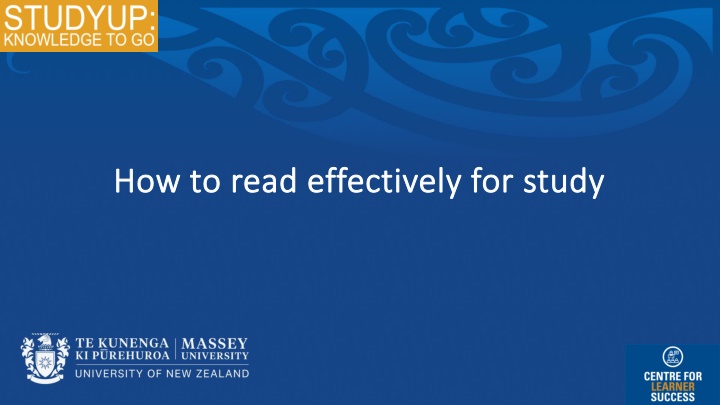



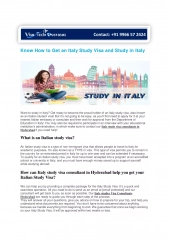

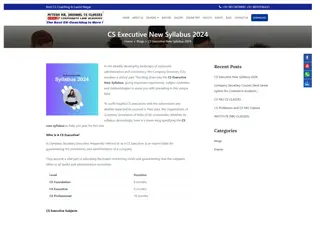
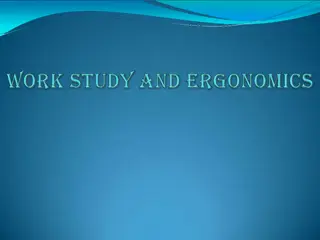
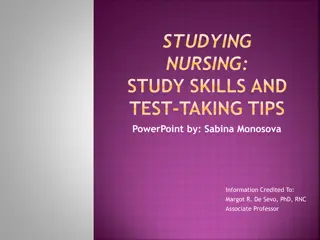


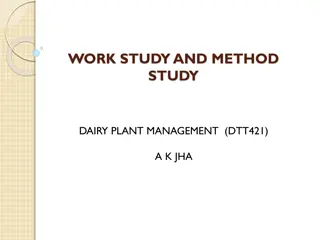
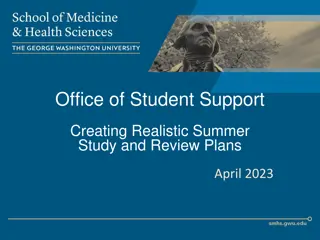
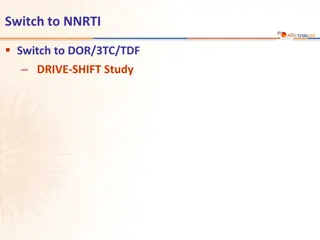
![[Insert Study Name] Study Webinar: Engaging Participants for Research Progress](/thumb/168084/insert-study-name-study-webinar-engaging-participants-for-research-progress.jpg)
